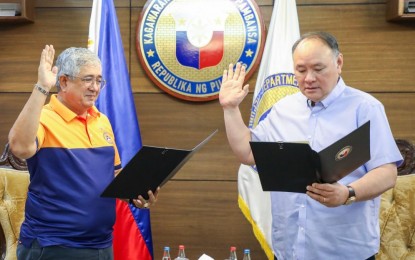MANILA – The new head of the Office of Civil Defense (OCD) formally assumed command of the disaster response agency on Tuesday.
Undersecretary Harold Cabreros took his oath as OCD administrator before Department of National Defense (DND) Secretary Gilberto Teodoro Jr. in a ceremony at Camp Aguinaldo, Quezon City.
A statement said Cabreros replaced OCD officer-in-charge and concurrent deputy administrator for administration, Assistant Secretary Bernardo Rafaelito Alejandro IV.
Alejandro was named OCD officer-in-charge in June after then-OCD chief Ariel Nepomuceno was appointed Bureau of Customs commissioner.
Teodoro expressed confidence in Cabreros’ leadership and capabilities to steer the country’s comprehensive civil defense and disaster resilience programs, in support of the National Disaster Risk Reduction and Management Council.
Cabreros previously served as director of the Rehabilitation and Recovery Management Service of the OCD.
A member of Philippine Military Academy Class of 1984, he joined the agency in 2017 shortly after his retirement from the military.
The OCD is the primary government agency mandated to implement and administer policies, strategies, and systems to reduce the country’s vulnerabilities and risks to hazards, as well as manage the consequences of disasters.
Camp Aguinaldo
Camp Aguinaldo is the national military headquarters of the Philippines, named after Emilio Aguinaldo, the first president of the country. It was established in 1935 as the original camp of the newly formed Philippine Army and has since been a central site for the nation’s defense and military administration.
Quezon City
Quezon City was established in 1939 and served as the capital of the Philippines from 1948 to 1976, named after the country’s second president, Manuel L. Quezon. Today, it is the most populous city in the Philippines and a major center for government, education, and commerce, housing important institutions like the House of Representatives and the University of the Philippines.
Office of Civil Defense
The Office of Civil Defense (OCD) is a Philippine government agency under the Department of National Defense, established to ensure the protection and welfare of the public during disasters and emergencies. It was originally created in 1972 through Presidential Decree No. 1 and is responsible for implementing comprehensive disaster risk reduction and management programs. The OCD coordinates national efforts in disaster preparedness, response, and recovery, working with local government units and other stakeholders.
Department of National Defense
The Department of National Defense is a government ministry responsible for managing a nation’s military forces and ensuring its national security. Its history is tied to the modern formation of the state, often established to centralize and oversee the army, navy, and air force. Its primary mission is to provide for the defense and protection of the country and its interests.
National Disaster Risk Reduction and Management Council
The National Disaster Risk Reduction and Management Council (NDRRMC) is the Philippines’ lead government agency responsible for ensuring the protection and welfare of the people during disasters and emergencies. It was established to replace the National Disaster Coordinating Council (NDCC) through the Philippine Disaster Risk Reduction and Management Act of 2010, reflecting a strategic shift from reactive disaster response to proactive risk reduction. The council coordinates the efforts of its member agencies to prepare for, respond to, and recover from natural and human-induced calamities.
Philippine Military Academy
The Philippine Military Academy is the premier military institution in the Philippines, established in 1898 and formally organized under its current name in 1935. It is renowned for its rigorous training program, which molds future officers of the Armed Forces of the Philippines based on a core philosophy of “Courage, Integrity, and Loyalty.”
Bureau of Customs
The Bureau of Customs is a government agency responsible for regulating and facilitating international trade, primarily through the collection of import duties and taxes. Its history is intrinsically linked to a nation’s economic development, often established to protect domestic industries and generate crucial revenue for the state. Today, its functions have expanded to include border security, trade compliance, and the prevention of smuggling.






